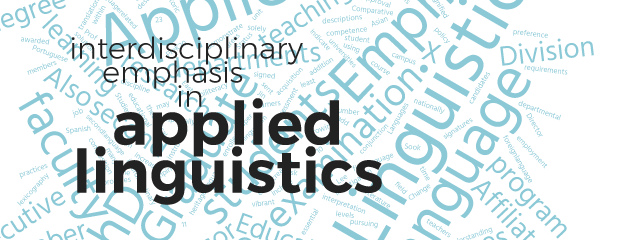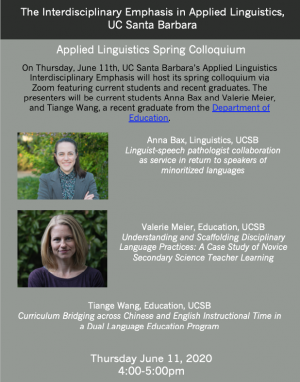Event Date:
- Colloquium
Anna Bax, Linguistics, UCSB
Linguist-speech pathologist collaboration as service in return to speakers of minoritized languages
Linguists have long been concerned with the ethics of fieldwork with speakers of minoritized languages and dialects (Rice 2006). Documentary linguists (Czaykowska-Higgins 2009) and sociolinguists (Labov 1982; Wolfram 1983) have written extensively about the need to ensure that community-based linguistic research produces results of value to speakers. Rickford’s “service-in-return” includes the ethical responsibility to give back to communities through “activities that draw on our expertise and involvement as linguists” (1997:182). This paper demonstrates how collaborations between linguists and speech-language pathologists (SLPs) who work with multilingual speakers of minority languages can fulfill the obligation of service-in-return. I discuss an ongoing collaborative effort to create resources for SLPs who work with members of the growing, multi-varietal diasporic Mixtec (Otomanguean) community in California. I argue that linguists can enact service-in-return by assisting SLPs who serve minority-language clients in several ways: “translating” formal descriptions of phonology and morphosyntax into a style understandable by non-specialists; providing explicit comparisons of L1 and L2 linguistic patterns; explicating dialectal and sociolinguistic variation; clarifying pragmatic and interactional norms; describing community language socialization practices; and connecting SLPs with local language-based community organizations.
Valerie Meier, Education, UCSB
Understanding and Scaffolding Disciplinary Language Practices: A Case Study of Novice Secondary Science Teacher Learning
Persistent disparities in access to quality STEM education for multilingual learners (National Academies of Sciences, Engineering, and Medicine, 2018) underscore the importance of preparing science teachers who can create meaningful contexts for content learning and language development. To do so, science teachers must understand the relationship between disciplinary language and sense-making practices and know how to effectively scaffold their multilingual students’ engagement in these practices. Although a growing body of literature has detailed the knowledge and skills science teachers must cultivate in order to be responsive teachers of multilingual learners (e.g., Lyon, Tolbert, Stoddart, Solís, & Bunch, 2016), fewer studies have described novice secondary science teachers’ understandings and instructional practices or documented how these change over time. Employing an academic literacies framework (Molle, 2015), I trace the development of three secondary science teachers’ understanding of academic literacies and their ability to support their multilingual learners’ academic literacy development. In this talk I will present a case study of one of these teachers using interview and classroom observation data collected over four years.
Tiange Wang, Education, UCSB
Curriculum Bridging across Chinese and English Instructional Time in a Dual Language Education Program


